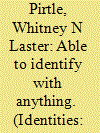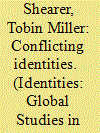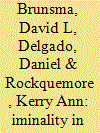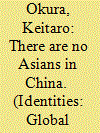|
|
|
Sort Order |
|
|
|
Items / Page
|
|
|
|
|
|
|
| Srl | Item |
| 1 |
ID:
190923


|
|
|
|
|
| Summary/Abstract |
The Apartheid South African state crafted Coloured racial identities through a powerful racial project that signified and positioned them as a group that was both neither and between White and Black. Non-Racialism in post-Apartheid South Africa has, however, loosened the role of the state in making race. So how has the transition of the state impacted ‘Coloured’ racial identities today? Informed by both macro-level theories of racial formation and micro-level theories of racial identities, I examine racial identity choices as constrained by the state among 50 adults. I find identities choices are influenced by transformations in the racial state: racialisation via reappropriating ‘Coloured’; re-formation and joining of ‘Black’; racial uplift construction as ‘Khoisan’; and a non-racialist approach to identity as ‘Human’. I argue transformations of the racial state shape, or even lead to, a transition in racial identities and therefore clarify theorises of co-constructed racial identity formations.
|
|
|
|
|
|
|
|
|
|
|
|
|
|
|
|
| 2 |
ID:
114635


|
|
|
|
|
| Publication |
2012.
|
| Summary/Abstract |
In this essay, I argue that rather than correlating white identity and whiteness studies first with invisibility, power and privilege, white identity is more accurately correlated with overt conflict and crisis. Moreover, the study of white racial formation in one US-based but internationally focused religious organization between 1960 and 1985 also suggests that white identity is a conflict that results in power and privilege but that the power and privilege do not define the identity itself.
|
|
|
|
|
|
|
|
|
|
|
|
|
|
|
|
| 3 |
ID:
123918


|
|
|
|
|
| Publication |
2013.
|
| Summary/Abstract |
Although researchers have investigated Multiracials for their racial identity 'choices', many scholars continue to conceptualise racial identity as monolithic. This article both problematises and extends the notion of racial identity with an 'identity matrix'. This concept grounds the sociological processes of constructing and deploying a racial identity as strategic and agentic in interactional, political, cultural, physical (embodiment) and institutional contexts. Using insights from survey data from 231 black-white Multiracial young adults and follow-up in-depth interviews with 24 of these respondents, we develop the concept of 'identity matrix' both theoretically and empirically. This article provides heuristic results that we hope will encourage more development of methodological and theoretical complexity in the study of racial identity, allowing scholars to think about the various identities of Multiracials, the possibility of and conditions enabling an emergent Multiracial consciousness, as well as the socio-cognitive structure and active deployment of identity matrices across other social groups.
|
|
|
|
|
|
|
|
|
|
|
|
|
|
|
|
| 4 |
ID:
190766


|
|
|
|
|
| Summary/Abstract |
Studies show that racial and ethnic identity can significantly improve mental health and well-being among marginalized ethnoracial groups who experience racism and discrimination. However, the relationships between Pan-African identity, psychological well-being, and mental health have received less attention. Using a national sample of African American adults, I examine whether Pan-African identity impacts psychological well-being and self-rated mental health. The results show that respondents who feel closer towards members of the African diaspora and Black people in Africa and prefer Pan-African labels have better self-rated mental health and higher levels of self-esteem. Moreover, the analysis finds that respondents who prefer Pan-African labels have higher levels of mastery. Although self-esteem explains the self-rated mental health benefits of both Pan-African closeness and Pan-African label preferences, only mastery explains the relationship between Pan-African label preferences and self-rated mental health. This study demonstrates the possible psychological benefits of a globalized identity for marginalized groups in Eurocentric contexts.
|
|
|
|
|
|
|
|
|
|
|
|
|
|
|
|
| 5 |
ID:
177969


|
|
|
|
|
| Summary/Abstract |
Foreigners who arrive in the United States experience a process of racialization by which they adjust to the new racial realities of their host society. This paper presents a unique longitudinal study of racialization, drawing upon 30 interviews with 15 Chinese international students conducted twice per respondent over six months. The first interviews were carried out within two weeks of the students’ arrival in the U.S. to capture their pre-migration racial schemas and racial identity. Upon their arrival in the U.S., Chinese students primarily understand the concept of ‘race’ through the paradigm of nationality and racially identified as Chinese. Just half a year later, however, there was a striking shift towards a conceptualisation of race that emphasises phenotype over nationality, and some respondents began to identify with the pan-national racial label ‘Asian.’ I argue that these changes can be attributed to the process of racialization in the United States.
|
|
|
|
|
|
|
|
|
|
|
|
|
|
|
|
|
|
|
|
|